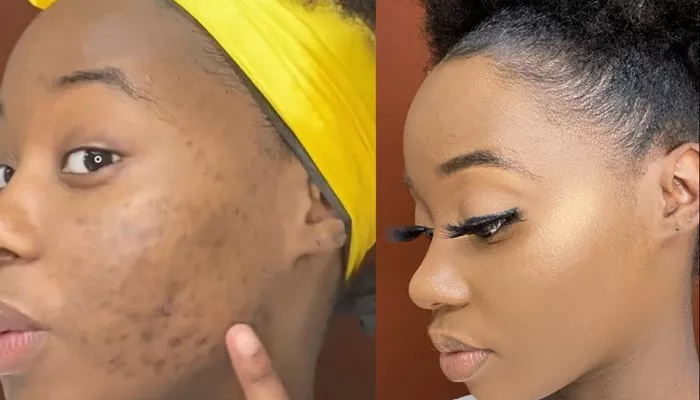Let’s be honest, the world of skincare can be confusing at times. While we may know a thing or two about acne and hyperpigmentation, how do they affect people with darker skin tones?
In order to find the right treatment for you, it’s crucial to understand the difference between the two conditions. While they may seem the same, acne scars have more to do with inflammation of the skin. Hyperpigmentation, on the other hand, is when some areas of the skin are darker than others. And both conditions are more noticeable on darker skin tones.
Acne causes inflammation of the skin. “When skin tissue becomes inflamed, it causes damage to the skin and tissue breakdown,” says Dr. Fabusiwa. “The skin tries to repair the damage by depositing collagen fibers at the site of tissue damage, and this dysregulated healing process can cause bumpy skin and scarring.”
There are four types of scars. “Hypertrophic scars are raised due to excessive healing; boxcar scars are deep depressions in the skin with well-defined borders; rolling scars are deep depressions in the skin with unclear borders; and icepick scars are narrow indentations in the skin that look like they were stabbed with an icepick,” she says.
Hyperpigmentation is when certain areas of your skin darken, causing an uneven skin tone. “This is caused by an increase in melanin production in certain areas of the skin,” says Dr. Fabusiwa.
While there are many factors that contribute to hyperpigmentation, sun exposure is the biggest risk factor to consider.
Melanin protects our skin from the sun’s rays. When we are exposed to high levels of UV radiation, our skin responds by producing excess melanin.
Inflammation is another cause of hyperpigmentation. “When the skin is damaged, melanin is deposited along the site of damage. Even minor trauma to the skin can lead to severe post-inflammatory hyperpigmentation,” says Dr. Fabusiwa.
“Treating acne scars and hyperpigmentation is a marathon, not a sprint. With hard work and persistence, the appearance of scars and hyperpigmentation can be reduced over time,” says Dr. Fabusiwa.
These are four products you should keep in your skincare arsenal.
SPF: Daily use of SPF sunscreen is essential to prevent hyperpigmentation. “Prevention is better than cure, there’s no doubt about that. UV rays hitting the surface of our skin cause melanin-producing cells to release more melanin, which can cause dark pigmented scars. La Roche-Posay’s Anthelios SPF50+ and Glossier’s Invisible Shield SPF50 are both excellent sunscreens with a high SPF that won’t leave any white marks when in the sun.”
La Roche-Posay Anthelios UVMune 400 Invisible Fluid Unscented Sunscreen SPF50+
Buy La Roche-Posay Anthelios UVMune 400 Invisible Fluid Unscented Sunscreen SPF50+ at Lookfantastic for £20
Glossier Invisible Sunscreen SPF50
Buy Glossier Invisible Shield SPF50 for £32
Vitamin C: It promotes wound healing and reduces pigmentation, making it a great addition for those battling uneven skin.
CeraVe 10% Pure Vitamin C Renewal Serum
Buy CeraVe Renewal 10% Pure Vitamin C Serum at LookFantastic for £29
Retinols: They both prevent and treat acne. “Retinols prevent acne from forming in the first place, which reduces the likelihood of scarring, and they can also help reduce the appearance of scars once they have occurred. La Roche-Posay Retinol B3 Serum is a great place to use retinol.”
La Roche-Posay Retinol B3 Serum
Buy La Roche-Posay Retinol B3 Serum with Retinol and Vitamin B3 at Boots for £48
Acid treatments: Exfoliating acids, such as glycolic and salicylic acid, are a great way to improve pigmentation, and one of the best ways to reduce it is with an advanced skin treatment from an aesthetician.
Finding a practitioner who understands how to safely use AHAs on dark skin is essential. Dark skin requires a primer with a lower concentration of AHAs before a peel so the skin can gradually adjust to the higher concentrations without causing inflammation. The Neostrata Glycolic and Citric Acid Peel is an effective monthly treatment for pigmentation control.
Neostrata Resurface Smooth Surface Glycolic Peel
Buy Neostrata Resurface Smooth Surface Gelcolic Peel at Sephora for £69

